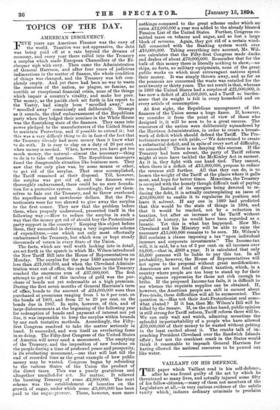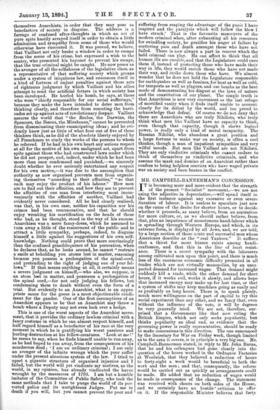VALLLANT ON HIS DEFENCE. T HE paper which Valliant read in
his self-defence, after he was found guilty of the act by which he threatened so many lives, and actually injured some fifty of his fellow-citizens,—many of them not members of the Legislature at all,—is very curious evidence of the subtle vanity which:, induces ordinary criminals to proclaim themselves Anarchists, in order that they may pose as benefactors of society in disguise. The address is a farrago of confused after-thoughts in which an act, of pure spite hastily arrayed itself in order to obtain a little admiration and sympathy from some of those who would otherwise have execrated it. It was proved, we believe, that Valliant not only broke a window in order to escape from the scene of his crime, but expressed a wish to the sentry, who presented his bayonet to prevent his escape, that the true criminal might be caught. He now poses as the avenger of all the selfishness of the legislative class, as a representative of that suffering society which groans under a system of iniquitous law, and ensconces itself in a kind of fortress of unjust penalties against those acts of righteous judgment by which Vaillant and his allies attempt to rend the artificial fetters in which society has been enveloped. He hurled his bomb, he says, at those who were "chiefly responsible for our social sufferings," because they make the laws intended to deter men from thinking clearly, and. therefore from resenting the barri- cades set up against acts of revolutionary despair. Valliant assures the world that "the Reclus, the Darwins, the Spencers, the Ibsens, the Mirabeaus," cannot be prevented from disseminating their emancipating ideas ; and he evi- dently knew just as little of what four out of five of these thinkers think, as he did of the absolute liberty enjoyed by all Frenchmen to study the works of the persons to whom he referred. If he had in his own heart any serious respect at all for the motive of his own malignant act, apart from spite against those who had constructed laws under which he did not prosper, and, indeed, under which he had been more than once condemned and punished,—we sincerely doubt whether he ever seriously entertained any respect for his own motive,—it was due to the assumption that authority as now organised prevents men from organis- ing themselves "according to their affinities," "so that each may enjoy the product of his labour." How men are to find out their affinities, and how they are to prevent the affinities of one man from interfering most incon- veniently with the affinities of another, Vaillant had evidently never considered. All he had clearly realised, was that, in his own case, neither his capacities nor his crimes had been remunerative, and that he should enjoy wreaking his mortification on the heads of those who had, as he thought, stood in the way of his success. Anarchism was a mere fancy-dress, which he assumed to turn away a little of the resentment of the public and to attract a little sympathy, perhaps, indeed, to disguise himself a little against the suggestions of his own self- knowledge. Nothing could prove that more convincingly than the confused grandiloquence of his peroration, when he declares that, as he looks around, he cannot "restrain a smile at beholding you atoms lost in matter, reasoning because you possess a prolongation of the spinal-cord, and pretending to the right of judging one of your fel- lows." If that means anything at all, it certainly means a severe judgment on himself,—who also, we suppose, is an atom lost in matter, and possesses a prolongation of the spinal cord,—for not only judging his fellows, but condemning them to death without even the form of a trial. But evidently to an Anarchist, what is an appro- priate sauce for the goose is a most objectionable condi- ment for the gander. One of the first assumptions of an Anarchist appears to be that an Anarchist may throw a bomb where a Deputy may not even look over a hedge.
This is one of the worst aspects of the Anarchist move- ment, that it provides the ordinary lawless criminal with a fancy costume in which he can almost respect himself, and half regard himself as a benefactor of his race at the very moment in which he is gratifying his worst passions and hurling destruction at his fellow-creatures. Look at me !' he seems to say, when he finds himself unable to run away, as he had hoped to run away, from the consequences of his murderous deed ; I am no ordinary criminal ; I am only an avenger of the infinite wrongs which the poor suffer under the present atrocious system of the law. I tried to upset a gigantic structure of organised injustice and I failed, but the world will yet vindicate my motives, as the world, in my opinion, has already vindicated the havoc wrought by the massacres of 1793. I am but a humble imitator of the Committee of Public Safety, who took the same methods that I take to purge the world of its per- verted police and its unrighteous Judges. Put me to death if you will, but you cannot prevent the poor and suffering from reaping the advantage of the panic I have inspired and the paralysis which will follow the blow I have struck.' That is the favourite manceuvre of the modern criminal when, after exhausting all his resources for swindling society, he gratifies his anger at failure by scattering pain and death amongst those who have not failed. There is now always a part in reserve which the bold criminal can play. He can affect to think that all human ills are curable, and that the Legislature could cure them if, instead of protecting those who have made their way in life, they would enrich those who have not made their way, and strike down those who have. We almost wonder that he does not hold the Legislature responsible for earthquakes as well as famines, for heat as well as cold, for tempests as well as plagues, and use bombs as the best mode of demonstrating his disgust at the laws of nature and the constitution of our planet. The simple truth is that Anarchism is now very convenient as the last refuge of mortified vanity when it finds itself unable to account clearly for its defeat by the world, and too proud to acknowledge that defeat. Of course we do not deny that there are Anarchists who are truly Nihilists, who truly think what men like Valliant have no capacity to think, even though that capacity, though it shows logical power, is really only a kind of moral incapacity. The Russian Nihilist, who abandons a great position and a large fortune to make war on society, is often a cool thinker, though a man of impatient sympathies and very wilful moods. But men like Valliant are not Nihilists. They are only vindictive criminals who cannot endure to think of themselves as vindictive criminals, and who assume the mask and domino of an Anarchist rather than confess to being helpless convicts wha have waged private war on society and been beaten in the conflict.







































 Previous page
Previous page